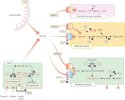If I understand your post
@There is no Spoon , I believe your brain will always prefer glucose and will struggle at first to adapt to a very low carb diet due to much lower sugar availability. Whilst your brain adapts you feel dreadful, like you've got flu symptoms. People call this ' Keto flu' . In short keto flu is often described as how you feel whilst your body is adapting to the new very low carb diet.
Yes, glycogen stores only last between 12-24 hours. I often use up all my glycogen stores as I am into fitness and exercise, hence I produce ketones, but I am not on a very low carb diet. So once these glycogen stores are depleted the body will turn to fat breakdown or lipolysis for its energy. This comes from the breakdown of Adipose fat. Adipose fat is found around your abdomen and organs. There is a biochemical process that takes place with this type of fat that has a negative impact on your metabolism. It is different from subcutaneous fat which often sits around your thighs , hips, and is harmless.
The liver will then break down this adipose fat into ketones. Ketones can be used as an alternative to glucose , my understanding is the brain cannot function on ketones alone it will need some glucose to function properly. I'm happy to be corrected on that. The body is remarkable and will adapt.
Adipose fat I believe is converted to Fatty acids and ketones , not directly back to glycogen.
Edited grammar

